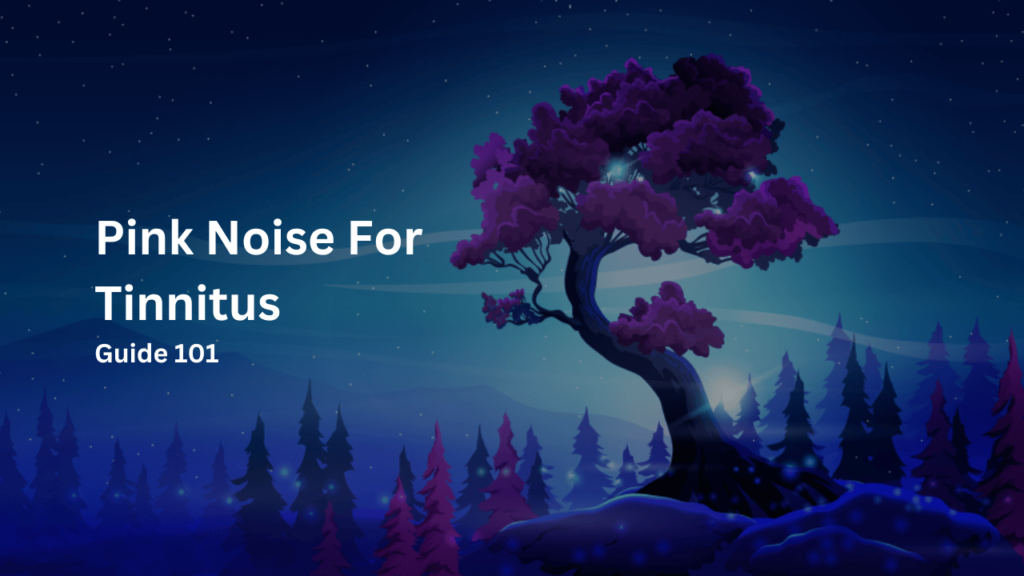Tinnitus, characterised by the perception of noise or ringing in the ears in the absence of external sound, is a condition that affects a significant portion of the population.
It can manifest in various forms, including ringing, buzzing, hissing, or whistling sounds, and can significantly impact an individual’s quality of life by affecting concentration, sleep, and emotional well-being.
Among the auditory therapies explored for tinnitus relief, pink noise has emerged as a noteworthy option.
This article delves into what pink noise is, its potential benefits for tinnitus sufferers, and how to incorporate it into a management strategy.

Understanding Pink Noise
Pink noise is a type of sound in which each octave carries an equal amount of noise energy.
It is characterised by a decrease in intensity by 3 decibels per octave, resulting in a deeper sound compared to white noise, with more emphasis on lower frequencies.
Common examples of pink noise in nature include steady rain, wind rustling through leaves, and ocean waves.
The balanced energy distribution across the frequency spectrum makes pink noise particularly soothing and conducive to relaxation and sleep.

The Science Behind Pink Noise and Tinnitus Management
1. Sound Masking
Pink noise can help mask the internal sounds of tinnitus, making them less noticeable. This is particularly beneficial in quiet environments where tinnitus sounds can be more pronounced and disruptive.
You can also try Brown Noise For Tinnitus or Green Noise For Tinnitus as each of these sound noises operate on a certain level of frequency that can help cure or atleast manage the problem.
2. Auditory Habituation
Regular exposure to pink noise may aid in auditory habituation, a process through which the brain gradually becomes accustomed to tinnitus sounds, reducing their perceived loudness and the distress they cause.
3. Sleep Improvement
Many individuals with tinnitus experience difficulty sleeping.
Pink noise, with its soothing, natural-sounding characteristics, can create a more conducive environment for sleep by masking tinnitus sounds and promoting relaxation. Green Noise for sleeping is also considered very helpful.

4. Enhanced Concentration
For those whose tinnitus interferes with concentration, the consistent background of pink noise can help by reducing the distraction caused by tinnitus, allowing for better focus on tasks.
Implementing Pink Noise in Tinnitus Management
1. Pink Noise Generators and Apps
There are various devices and applications available that generate pink noise. Experimenting with different sources can help you find the one that’s most effective for your needs.
2. Volume and Timing
It’s important to listen to pink noise at a safe, comfortable volume to avoid exacerbating tinnitus or causing hearing damage.
Using pink noise during periods of high tinnitus disturbance, such as during work or before bedtime, can be particularly effective.
3. Personalization
The effectiveness of pink noise can vary from person to person. It may be helpful to combine pink noise with other tinnitus relief strategies, such as relaxation techniques, cognitive-behavioural therapy (CBT), or Tinnitus Retraining Therapy (TRT), for a more comprehensive approach.
4. Consultation with Professionals
Before incorporating pink noise into your tinnitus management plan, consulting with a healthcare professional, such as an audiologist or a tinnitus specialist, is advisable. They can provide personalised advice and ensure that your management strategy is safe and effective.
Frequently Asked Questions (FAQs)
Ques 1: Does pink noise help with tinnitus?
Ans: Yes, listening to gentle, steady pink noise can help mask tinnitus sounds and may retrain the brain to reduce perception of the ear ringing over time.
Ques 2: Does pink noise make tinnitus worse?
Ans: It’s unlikely, if kept at a reasonable volume. But loud volumes of pink noise could potentially aggravate tinnitus temporarily.
Ques 3: Can pink noise damage your hearing?
Ans: At high volumes used for a long time, there is a risk of hearing damage. But at more moderate levels, pink noise is generally considered safe.
Ques 4: Is it OK to listen to pink noise all night?
Ans: Listening to soft, continuous pink noise can be helpful for sleep. But take occasional breaks and don’t play it loudly all night, every night.
Ques 5: Is it OK to sleep with pink noise?
Ans: Yes, pink noise is often recommended to help those with tinnitus sleep better. A sleep study found no ill effects. But avoid very high volume.
Conclusion
Pink noise offers a promising avenue for individuals seeking tinnitus remedy at home.
Its unique acoustic properties can mask tinnitus sounds, aid in relaxation and sleep, and improve concentration. While the effectiveness of pink noise can vary among individuals, it represents a valuable component of a holistic tinnitus management strategy.
By combining pink noise with other therapeutic approaches and consulting with healthcare professionals, individuals with tinnitus can find significant relief and enhance their quality of life



